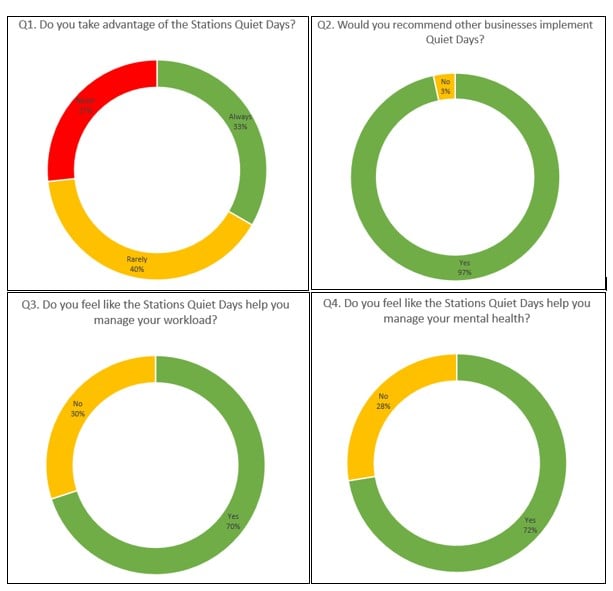‘Quiet Days’ improve productivity and mental health
The Stations team identified that meeting overload was creating a lack of productivity and detrimental impact upon individuals’ wellbeing. Therefore the concept of a ‘Quiet Day’ was introduced, to give a day each month to all staff within the Stations Team, free of any meetings, endorsed by the leadership, allowing everyone to catch up on those tasks that always seem to get pushed back and simmer in the background.
This is not a day to do nothing, but perhaps a day in which individuals are empowered to reflect on where they are and what they are doing, read that document they never get round to, complete some e-learning modules, do some reading around industry press / best practice or to simply catch up with some admin.
The days only work if everyone buys into them and people are respectful of each other’s diaries. The initial feedback indicated a positive impact on individuals mental health and productivity so after a trial, this has now become the norm within the Stations Team.
This paper will be of interest to other projects looking to improve ways of working in busy teams.
Background and industry content
It is no secret that many individuals find those days around Christmas and other major holidays where the office is quiet, and all the meetings are on hold – some of the most productive days to be working. During a Values moment back in January 2020, a member of staff commented on this productivity and how nice it would be to have similar days throughout the year, this notion was taken on by a senior member of the team, developed into the Quiet Days concept and rolled out Stations wide from June 2020.
What began as a tongue in cheek ode to the Depeche Mode song “Enjoy the Silence” led to the idea to give everyone a little more time in their diaries to not only help their mental state, but to also allow time to get some work done and boost productivity, free of obligations to a diary full of meetings that does not allow time to complete any tasks or continues to push them down the pecking order.
Within the Stations Team, perhaps owing to the nature of the working from home environment that everyone found themselves in during 2020 and beyond; Quiet Days are generally well regarded and while the view of the team is not unanimous, with a few tweaks Quiet Days can be an invaluable concept to introduce into any business or project that has extensive need for collaborative working and meetings.
Stations Team – Quiet Days feedback survey 2021
A short survey to display perceptions of the Stations Quiet Days was undertaken in early 2021, attaining responses from 30 members of the Stations Team staff.
As the graphical results of the survey provided in Figure 1 reveal, it is not always possible for all members of the Stations team to take advantage of Quiet Days, this is likely due to the scheme not being integrated company-wide or within the contractors meaning other departments and businesses are free to schedule meetings during these days – this is reflected in some of the later questions that delve more into individual views, and a persistent feedback being that Quiet Days needs to be implemented company-wide to be respected and observed by all.

As suggested earlier, the later questions in the survey, listed below, were to attain more personal views and feedback to inform some lessons learned and recommendations for further development of Quiet Days:
- How do you primarily use your Stations Quiet Days?
- What do you like most about Stations Quiet Days?
- Any additional comments/suggestions for Stations Quiet Days?
Lessons learned and successes
From the feedback forms, it was found that the following aspects of Quiet Days could do with some improvements or remain uncertain:
- As Quiet Days are only observed by the Stations Team, teams outside of this do not respect or have an awareness of it and will book in meetings regardless.
- It remains to be seen whether this would work outside of the working from home environment – a lot of empty meeting rooms in an office would lead to temptation.
- During times of heavy delivery and tight milestones it may be harder to commit to entire days without meetings.
- Similarly, in a site environment or a phase of site works, where daily safety briefings and similar activities are necessary, compliance with Quiet Days would not be possible.
And these elements seem to be well perceived within the team:
- Gives time to catch up on training, administrative tasks and personal development or even to truly focus for a full day without interruptions.
- Team members feel empowered to say no to meetings when they have deliverables that require their attention.
- Some individuals just appreciate the extra time in the day to ease the anxiety of having multiple meetings and deliverables on their plate.
Recommendations
For another business or project to successfully implement their own version of Quiet Days, the following recommendations should be followed:
- The scheme must be implemented business or project wide – if only one part of a wider team is implementing the scheme then not everyone will respect it and it loses some of its worth.
- Perhaps this day could be rebranded to a ‘Productivity Day’ to quickly convey the core message.
- Consult with the business/project staff and determine how best to implement this – would half days more often be more appropriate?
Acknowledgements
Niki French – Senior Project Manager, Interchange Station – HS2 Ltd
Sara Czechowicz – Project Manager, APM – HS2 Ltd
Nicholas Mooney – Assistant Project Manager, Interchange Station – HS2 Ltd

